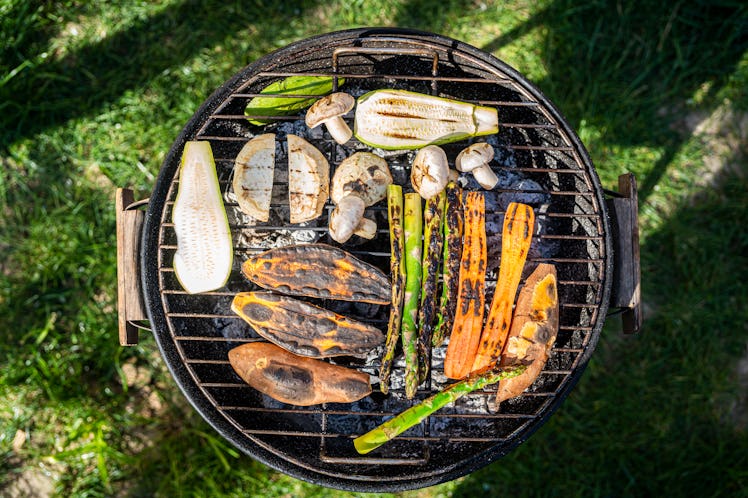
Here's What You Should Know Before Planning A Family Gathering For Father's Day
With Father's Day coming up on Sunday, June 21, your family may be planning a traditional outdoor barbecue. But in the midst of the coronavirus pandemic, is it safe to grill on Father's Day? Here's what you need to know before you plan a family gathering to celebrate dad or the father figures in your life.
As of Wednesday, June 17, many states have lifted stay-at-home orders with precautionary restrictions, but that doesn't mean the coronavirus pandemic is over. When it comes to small outdoor gatherings, Rachael Piltch-Loeb, Ph.D, a preparedness fellow at Harvard's T.H. Chan School of Public Health, tells Elite Daily, "Families are making a choice that carries risks to it if they get together." The novel coronavirus is thought to mainly spread through respiratory droplets during person-to-person contact, according to the Centers for Disease Control and Prevention (CDC), and even if you gather outdoors, there are still some risks involved. "To minimize those risks, [families] should get together in an outdoor setting with as few people as possible," Piltch-Loeb says.
Any possible outdoor get-togethers on Father's Day should follow guidance from the CDC. Piltch-Loeb explains, "Social distancing is still recommended and masks should be worn when social distancing is not possible." As of May 6, the CDC's social distancing guidelines include avoiding anyone outside of your immediate household, wearing a face covering over your mouth and nose, and maintaining a six-foot distance from others. According to CDC guidance as of June 12, large gatherings where people travel from out of town and can't maintain a six-foot distance pose the highest risk for spread of the novel coronavirus.
There are also other precautionary measures to consider when bringing together family members in a small outdoor gathering. As Piltch-Loeb points out, elderly family members and those with underlying conditions have a higher risk of severe illness if they contract COVID-19. As difficult as it might be, she recommends not gathering in groups with those individuals just yet. If you do have high-risk family members in attendance, Piltch-Loeb says, "People should maintain their social distance and wear masks when coming nearby."
If you have a small gathering on Father's Day, Piltch-Loeb says staying outside is preferable, thanks to the greater air circulation: "Outdoor gathering is better than indoors. This is because if someone possibly has the virus, they are less likely to spread it to others when outdoors." The risk heightens indoors where there is a "greater concentration of possible virus in one area."
It's also important to maintain distance at a small outdoor gathering in case someone is an asymptomatic carrier. Karen Levy, Ph.D, MPH, an environmental microbiologist and epidemiologist and associate professor of environmental health at Emory University's Rollins School of Public Health, previously told Elite Daily there is "good evidence to suggest that people with no symptoms can transmit the virus." She also warned, "They might be the most infectious in the period before symptoms appear."
In addition to keeping your distance and wearing face coverings, you should take precautions with the food and how you serve it. As of June 17, the CDC says there's little risk of contracting the virus from prepared food, but the CDC warns people at small gatherings should not share objects, which means you may want to provide personal utensils, cups, and plates. The CDC notes it "may be possible" to contract the virus from a contaminated surface, but it's not thought to be the main way it spreads. To play it safe, it's important to wash your hands with soap and water for at least 20 seconds (or otherwise sanitize them) after touching surfaces.
If you've recently attended a protest to support the Black Lives Matter movement, you'll want to take even more precautions. Piltch-Loeb says, "After attending a protest, individuals should quarantine for the first few days and then can get tested for coronavirus." If your test comes back positive, you should contact your doctor. Additionally, the CDC says someone who tests positive for COVID-19 should stay home (except for getting medical care), quarantine in a separate room, stay hydrated, get plenty of rest, and monitor symptoms.
If you're test is negative and you have no symptoms in the days after receiving your test results, you should proceed with caution. Finally, Piltch-Loeb says, "If you have any symptoms or feel under the weather, skip seeing family."
If you think you’re showing symptoms of coronavirus, which include fever, shortness of breath, and cough, call your doctor before going to get tested. If you’re anxious about the virus’s spread in your community, visit the CDC for up-to-date information and resources, or seek out mental health support. You can find all Elite Daily's coverage of coronavirus here.
Experts cited:
Rachael Piltch-Loeb, Ph.D, MPH, preparedness fellow at the Harvard T.H. Chan School of Public Health
Karen Levy, Ph.D, MPH, associate professor of environmental health at Emory University's Rollins School of Public Health